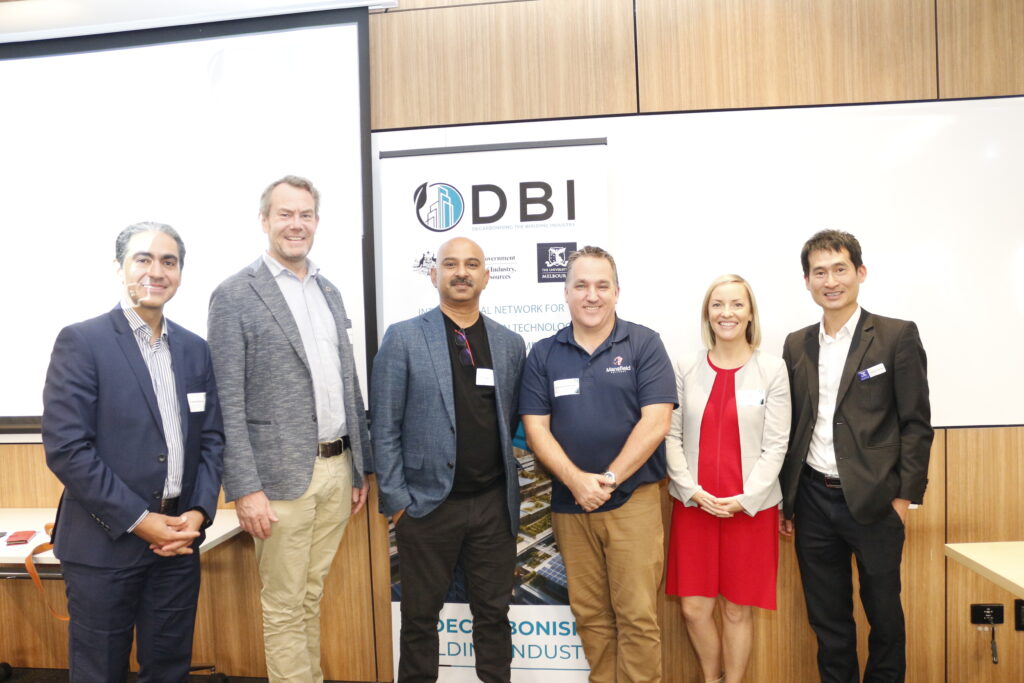Event date: March 22, 2024
Decarbonising the Building Industry Workshop - Morning Session Highlights
The Decarbonising the Building Industry (DBI) Network’s workshop on “Embodied Carbon Framework for Australia’s Built Environment” kicked off with a series of insightful presentations from key stakeholders in the industry (see the whole day’s description through this link). The morning session, held on March 22, 2024, in Melbourne, featured speakers from NABERS, MECLA, the Green Building Council of Australia, and ASBEC, each offering unique perspectives on the embodied carbon framework. The presentations covered topics such as the development of a national standard for embodied carbon, bottom-up approaches to addressing the issue, policy platforms like Every Building Counts, and national initiatives championed by ASBEC.

Opening remarks by Professor Tuan Ngo
Professor Tuan Ngo, the DBI Network Convener, opened the workshop by emphasizing the importance of collaboration and innovation in reducing embodied carbon in the construction sector.
NABERS Consultation and tool development by James Elks
James Elks from NABERS discussed developing a national standard for embodied carbon, aiming to enhance building sustainability through better design and material procurement. Highlighting NABERS’ role in benchmarking building sustainability, James Elks emphasized the urgent need for action on embodied carbon to complement operational efficiencies. The presentation covered consultation efforts, the importance of Environmental Product Declarations (EPDs), and the plan to implement these standards in 2024, marking a significant step towards Australia’s net-zero targets.
MECLA by Hudson Worsley
Hudson Worsley from Materials & Embodied Carbon Leaders’ Alliance (MECLA) introduced a bottom-up approach to addressing embodied carbon in the construction industry, emphasizing collaboration among stakeholders to create a circular economy aligned with the Paris Agreement. MECLA, described as a “do tank,” focuses on demonstrating demand, defining best practices, and sharing knowledge to drive reductions in embodied carbon. Highlighting the importance of collective action, Hudson Worsley showcased MECLA’s wide-ranging collaborations, including over 160 partner organizations, and introduced initiatives like the Public Pledge and a readiness index to assess the industry’s capability to deliver low-carbon solutions across different regions.
Every Building Counts policy platform by Shay Singh
Shay Singh from the Green Building Council of Australia shared insights on Every Building Counts, a policy platform aimed at enhancing the sustainability of Australia’s built environment. Introduced in 2019 and updated to include embodied carbon focus, the Every Building Counts document guides government action across eight themes, from zero carbon buildings to electrification and energy reform. It highlights the importance of independently verified rating tools to combat greenwashing and supports the adoption of a national framework for measuring embodied carbon. This collaborative effort with the Property Council of Australia marks a pivotal step towards actionable policies for sustainable development.
ASBEC project and "embodied carbon explainer" by Alison Scotland and Jeremy Mansfield
Alison Scotland and Jeremy Mansfield described Australian Sustainable Built Environment Council (ASBEC), a peak body collaborating with industry, non-profits, and government to advance sustainable development in the built environment, aligned with UN goals and Paris targets. ASBEC champions national efforts to reduce embodied carbon in Australia’s built environment, advocating for standardized tools and policies that promote low-carbon materials and design innovation. By harnessing research and policy development, ASBEC seeks to streamline sustainable urban development practices, marking a key advancement in Australia’s decarbonization journey.
These thought-provoking presentations set the stage for the afternoon’s roundtable discussions, which delved deeper into specific challenges and opportunities related to low-carbon products, skills development, managing trade-offs, and supporting standards and specifications.

